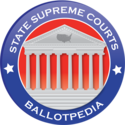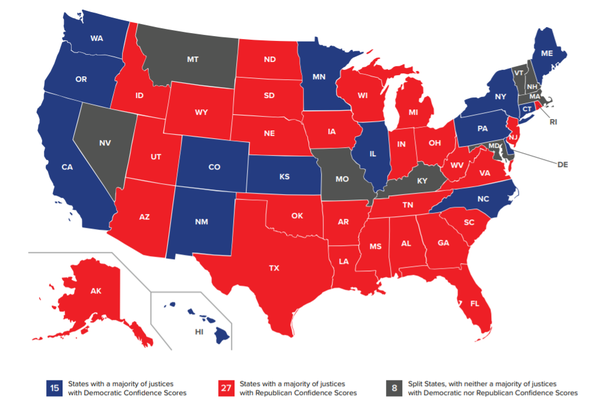Arkansas Supreme Court
| Arkansas Supreme Court |
|---|

|
| Court Information |
| Justices: 7 |
| Founded: 1836 |
| Location: Little Rock |
| Salary |
| Associates: $203,625[1] |
| Judicial Selection |
| Method: Nonpartisan elections |
| Term: 8 years |
| Active justices |
Founded in 1836, the Arkansas Supreme Court is the state's court of last resort and has seven judgeships. The current chief of the court is Dan Kemp.
As of July 2023, six judges on the court were elected in nonpartisan elections. One judge was appointed by a Republican governor.
The Arkansas Supreme Court meets in Little Rock, Arkansas. The court typically sits for a term beginning the first week of September and ending the first week of July.[2]
In Arkansas, state supreme court justices are elected in nonpartisan elections. There are 13 states that use this selection method. To read more about the nonpartisan election of judges, click here.
Jurisdiction
Article 7, Section 4 of the Arkansas Constitution describes the jurisdiction of the Supreme Court. This section was later amended by Amendment 80, Section 2.
The court has appellate jurisdiction. It may transfer a case from lower courts in certain circumstances or bring special proceedings to the higher court as outlined in Article VI. The court also has a supervisory role over all other courts in the state, over the conduct of attorneys, and over the practice of law within the state.[3]
The supreme court also has authority to regulate the practice of law and the professional conduct of attorneys, the power to determine appellate jurisdiction of the court of appeals, and the power to determine reassignment of cases. The following types of cases are appealed directly to the supreme court from circuit, chancery, and probate courts: all cases involving interpretation of the state constitution; death penalty or life imprisonment appeals; certain petitions directed to state, county, or municipal officials, or to circuit, chancery, or probate courts; appeals regarding election procedures or elections; appeals regarding attorney discipline or the power of the court to regulate the practice of law; appeals regarding discipline or disability of judges; appeals following an appeal decided by the supreme court; any other cases required by law.[4]
The following text from Amendment 80, Section 2 of the Arkansas Constitution covers the organization and jurisdiction of the court:[5]
| “ |
(A) The Supreme Court shall be composed of seven Justices, one of whom shall serve as Chief Justice. The Justices of the Supreme Court shall be selected from the State at large. (B) The Chief Justice shall be selected for that position in the same manner as the other Justices are selected. During any temporary period of absence or incapacity of the Chief Justice, an acting Chief Justice shall be selected by the Court from among the remaining justices. (C) The concurrence of at least four justices shall be required for a decision in all cases. (D) The Supreme Court shall have: (1) Statewide appellate jurisdiction; (2) Original jurisdiction to issue writs of quo warranto to all persons holding judicial office, and to officers of political corporations when the question involved is the legal existence of such corporations; (3) Original jurisdiction to answer questions of state law certified by a court of the United States, which may be exercised pursuant to Supreme Court rule; (4) Original jurisdiction to determine sufficiency of state initiative and referendum petitions and proposed constitutional amendments; and (5) Only such other original jurisdiction as provided by this Constitution. (E) The Supreme Court shall have power to issue and determine any and all writs necessary in aid of its jurisdiction and to delegate to its several justices the power to issue such writs. (F) The Supreme Court shall appoint its clerk and reporter. (G) The sessions of the Supreme Court shall be held at such times and places as may be adopted by Supreme Court rule. [6] |
” |
Justices
The table below lists the current judges of the Arkansas Supreme Court, their political party, and when they assumed office.
| Office | Name | Party | Date assumed office |
|---|---|---|---|
| Arkansas Supreme Court Chief Justice | Dan Kemp | Nonpartisan | January 1, 2017 |
| Arkansas Supreme Court Position 2 | Cody Hiland | Nonpartisan | July 7, 2023 |
| Arkansas Supreme Court Position 3 | Courtney Hudson Goodson | Nonpartisan | January 1, 2011 |
| Arkansas Supreme Court Position 4 | Barbara Webb | Nonpartisan | January 1, 2021 |
| Arkansas Supreme Court Position 5 | Shawn Womack | Nonpartisan | January 1, 2017 |
| Arkansas Supreme Court Position 6 | Karen R. Baker | Nonpartisan | January 10, 2011 |
| Arkansas Supreme Court Position 7 | Rhonda Wood | Nonpartisan | January 1, 2015 |
Judicial selection
- See also: Judicial selection in Arkansas
The seven justices on the Arkansas Supreme Court are selected through nonpartisan elections. They compete in nonpartisan general elections—occurring at the same time as the primary elections for other state officials—in which the candidate who receives more than 50 percent of the vote wins the seat. If no candidate garners a majority of the vote, the top two candidates compete in a runoff during the November general election.[7]
The winners are elected to eight-year terms. Sitting justices must run for re-election at the expiration of their terms.[7]
Qualifications
To serve on this court, a justice must be:[8]
- at least 18 years old;
- a U.S. citizen and state resident;
- licensed to practice law in Arkansas for at least eight years;
- registered to vote; and
- a qualified elector within the geographic area from which chosen.
Chief justice
The court's chief justice is selected by voters at large and serves in that capacity for a full eight-year term.[9]
Vacancies
In the event of a midterm vacancy, an interim judge is selected by the governor to fill the empty seat. If the open seat would have been filled at the next general election if the vacancy did not occur, the appointed justice will serve the remainder of the unexpired term. If the open seat would not have been regularly filled at the next general election, the appointee will serve until the next general election if the vacancy occurred more than four months prior to the election. If the vacancy occurs less than four months prior to the next general election, then the justice will serve until the second succeeding general election.[7]
The map below highlights how vacancies are filled in state supreme courts across the country.
Elections
- See also: Arkansas Supreme Court elections
2024
- See also: Arkansas Supreme Court elections, 2024
The terms of three Arkansas Supreme Court justices will expire on December 31, 2024. The three seats were up for nonpartisan election on March 5, 2024. A general runoff election was scheduled for November 5, 2024. The filing deadline was November 14, 2023.
Candidates and results
Chief Justice
General runoff election
General runoff election for Arkansas Supreme Court Chief Justice
Karen R. Baker defeated Rhonda Wood in the general runoff election for Arkansas Supreme Court Chief Justice on November 5, 2024.
Candidate | % | Votes | ||
| ✔ |  | Karen R. Baker (Nonpartisan) | 52.7 | 541,946 |
 | Rhonda Wood (Nonpartisan)  | 47.3 | 487,199 | |
| Total votes: 1,029,145 | ||||
 = candidate completed the Ballotpedia Candidate Connection survey. = candidate completed the Ballotpedia Candidate Connection survey. | ||||
| If you are a candidate and would like to tell readers and voters more about why they should vote for you, complete the Ballotpedia Candidate Connection Survey. | ||||
Do you want a spreadsheet of this type of data? Contact our sales team. | ||||
General election
General election for Arkansas Supreme Court Chief Justice
Karen R. Baker and Rhonda Wood advanced to a runoff. They defeated Barbara Webb and Jay Martin in the general election for Arkansas Supreme Court Chief Justice on March 5, 2024.
Candidate | % | Votes | ||
| ✔ |  | Karen R. Baker (Nonpartisan) | 27.2 | 86,850 |
| ✔ |  | Rhonda Wood (Nonpartisan)  | 26.3 | 84,139 |
 | Barbara Webb (Nonpartisan) | 25.9 | 82,735 | |
 | Jay Martin (Nonpartisan) | 20.6 | 65,875 | |
| Total votes: 319,599 | ||||
 = candidate completed the Ballotpedia Candidate Connection survey. = candidate completed the Ballotpedia Candidate Connection survey. | ||||
| If you are a candidate and would like to tell readers and voters more about why they should vote for you, complete the Ballotpedia Candidate Connection Survey. | ||||
Do you want a spreadsheet of this type of data? Contact our sales team. | ||||
Position 2
General election
Special general election for Arkansas Supreme Court Position 2
Incumbent Courtney Hudson Goodson defeated Carlton D. Jones in the special general election for Arkansas Supreme Court Position 2 on March 5, 2024.
Candidate | % | Votes | ||
| ✔ |  | Courtney Hudson Goodson (Nonpartisan) | 60.3 | 189,087 |
 | Carlton D. Jones (Nonpartisan) | 39.7 | 124,619 | |
| Total votes: 313,706 | ||||
 = candidate completed the Ballotpedia Candidate Connection survey. = candidate completed the Ballotpedia Candidate Connection survey. | ||||
| If you are a candidate and would like to tell readers and voters more about why they should vote for you, complete the Ballotpedia Candidate Connection Survey. | ||||
Do you want a spreadsheet of this type of data? Contact our sales team. | ||||
Position 5
General election
The general election was canceled. Shawn Womack (Nonpartisan) won without appearing on the ballot.
Judges not on the ballot
- Dan Kemp (Chief Justice)
- Cody Hiland (Position 2)
2022
- See also: Arkansas Supreme Court elections, 2022
Candidates and results
Position 2
General runoff election
General runoff election for Arkansas Supreme Court Position 2
Incumbent Robin Wynne defeated Chris Carnahan in the general runoff election for Arkansas Supreme Court Position 2 on November 8, 2022.
Candidate | % | Votes | ||
| ✔ |  | Robin Wynne (Nonpartisan) | 58.4 | 450,094 |
 | Chris Carnahan (Nonpartisan)  | 41.6 | 321,123 | |
| Total votes: 771,217 | ||||
 = candidate completed the Ballotpedia Candidate Connection survey. = candidate completed the Ballotpedia Candidate Connection survey. | ||||
| If you are a candidate and would like to tell readers and voters more about why they should vote for you, complete the Ballotpedia Candidate Connection Survey. | ||||
Do you want a spreadsheet of this type of data? Contact our sales team. | ||||
General election
General election for Arkansas Supreme Court Position 2
Incumbent Robin Wynne and Chris Carnahan advanced to a runoff. They defeated David Sterling in the general election for Arkansas Supreme Court Position 2 on May 24, 2022.
Candidate | % | Votes | ||
| ✔ |  | Robin Wynne (Nonpartisan) | 49.5 | 202,815 |
| ✔ |  | Chris Carnahan (Nonpartisan)  | 28.8 | 117,859 |
 | David Sterling (Nonpartisan) | 21.7 | 88,938 | |
| Total votes: 409,612 | ||||
 = candidate completed the Ballotpedia Candidate Connection survey. = candidate completed the Ballotpedia Candidate Connection survey. | ||||
| If you are a candidate and would like to tell readers and voters more about why they should vote for you, complete the Ballotpedia Candidate Connection Survey. | ||||
Do you want a spreadsheet of this type of data? Contact our sales team. | ||||
Position 6
General election
General election for Arkansas Supreme Court Position 6
Incumbent Karen R. Baker defeated Gunner DeLay in the general election for Arkansas Supreme Court Position 6 on May 24, 2022.
Candidate | % | Votes | ||
| ✔ |  | Karen R. Baker (Nonpartisan) | 64.0 | 262,043 |
 | Gunner DeLay (Nonpartisan) | 36.0 | 147,481 | |
| Total votes: 409,524 | ||||
 = candidate completed the Ballotpedia Candidate Connection survey. = candidate completed the Ballotpedia Candidate Connection survey. | ||||
| If you are a candidate and would like to tell readers and voters more about why they should vote for you, complete the Ballotpedia Candidate Connection Survey. | ||||
Do you want a spreadsheet of this type of data? Contact our sales team. | ||||
Position 7
General election
The general election was canceled. Rhonda Wood (Nonpartisan) won without appearing on the ballot.
2020
- See also: Arkansas Supreme Court elections, 2020
Candidates and results
Position 4
General election
General election for Arkansas Supreme Court Position 4
Barbara Webb defeated Morgan Welch in the general election for Arkansas Supreme Court Position 4 on March 3, 2020.
Candidate | % | Votes | ||
| ✔ |  | Barbara Webb (Nonpartisan) | 53.6 | 245,736 |
 | Morgan Welch (Nonpartisan) | 46.4 | 212,443 | |
| Total votes: 458,179 | ||||
 = candidate completed the Ballotpedia Candidate Connection survey. = candidate completed the Ballotpedia Candidate Connection survey. | ||||
| If you are a candidate and would like to tell readers and voters more about why they should vote for you, complete the Ballotpedia Candidate Connection Survey. | ||||
Do you want a spreadsheet of this type of data? Contact our sales team. | ||||
Justices not on the ballot
- Josephine Hart (Position 4)
2018
- See also: Arkansas Supreme Court elections, 2018
Candidates and results
Position 3
Runoff election
General runoff election
General runoff election for Arkansas Supreme Court Position 3
Candidate | % | Votes | ||
| ✔ |  | Courtney Hudson Goodson (Nonpartisan) | 55.7 | 463,631 |
 | David Sterling (Nonpartisan) | 44.3 | 369,283 | |
| Total votes: 832,914 (100.00% precincts reporting) | ||||
 = candidate completed the Ballotpedia Candidate Connection survey. = candidate completed the Ballotpedia Candidate Connection survey. | ||||
| If you are a candidate and would like to tell readers and voters more about why they should vote for you, complete the Ballotpedia Candidate Connection Survey. | ||||
Do you want a spreadsheet of this type of data? Contact our sales team. | ||||
General election
General election
General election for Arkansas Supreme Court Position 3
Candidate | % | Votes | ||
| ✔ |  | Courtney Hudson Goodson (Nonpartisan) | 37.1 | 113,825 |
| ✔ |  | David Sterling (Nonpartisan) | 34.2 | 104,817 |
 | Kenneth Hixson (Nonpartisan) | 28.7 | 87,948 | |
| Total votes: 306,590 | ||||
 = candidate completed the Ballotpedia Candidate Connection survey. = candidate completed the Ballotpedia Candidate Connection survey. | ||||
| If you are a candidate and would like to tell readers and voters more about why they should vote for you, complete the Ballotpedia Candidate Connection Survey. | ||||
Do you want a spreadsheet of this type of data? Contact our sales team. | ||||
2016
- Main article: Arkansas Supreme Court elections, 2016
Two seats on the Arkansas Supreme Court were on the general election ballot for March 1, 2016.
The elections filled the seats set to be vacated by Paul Danielson's retirement at the end of his term and Howard Brill's ineligibility to run for re-election.[10]
Candidates
Chief Justice Position 1
- Incumbent Howard Brill did not run for re-election and retired in December 2016.
■ Circuit Judge John Dan Kemp ![]()
■ Supreme Court Associate Justice Courtney Goodson[10]
Associate Justice Position 5
- Incumbent Paul Danielson did not run for re-election and retired in December 2016.
■ Attorney Clark W. Mason
■ Circuit Judge Shawn A. Womack[10] ![]()
Election results
March 1 primary
| Arkansas Supreme Court, Chief Justice, 2016 | ||
|---|---|---|
| Candidate | Vote % | Votes |
| 57.56% | 344,523 | |
| Courtney Hudson Goodson | 42.43% | 253,941 |
| Total Votes (100% Reporting) | 598,464 | |
| Source: Arkansas Secretary of State Official ResultsSebastian County Arkansas | ||
| Arkansas Supreme Court Associate Justice Position 5, 2016 | ||
|---|---|---|
| Candidate | Vote % | Votes |
| 67.50% | 378,444 | |
| Clark Mason | 32.50% | 182,182 |
| Total Votes (100% Reporting) | 560,626 | |
| Source: Arkansas Secretary of State Official Results | ||
Caseloads
The table below details the number of cases filed with the court and the number of dispositions (decisions) the court reached in each year.[11] As of September 2024, data more recent than 2023 was not available online.
| Arkansas Supreme Court caseload data | ||
|---|---|---|
| Year* | Filings | Dispositions |
| 2023 | N/A | N/A |
| 2022 | N/A | N/A |
| 2021 | 211 | 264 |
| 2020 | 310 | 355 |
| 2019 | 442 | 397 |
| 2018 | 410 | 962 |
| 2017 | N/A | N/A |
| 2016 | 397 | 397 |
| 2015 | N/A | N/A |
| 2014 | 180 | 150 |
| 2013 | N/A | N/A |
| 2012 | 269 | 157 |
| 2011 | 275 | 224 |
| 2010 | 240 | 159 |
| 2009 | 320 | 366 |
| 2008 | 393 | 379 |
| 2007 | 396 | 407 |
*Data not available for 2013, 2015, 2017, 2022, and 2023
Analysis
Ballotpedia Courts: Determiners and Dissenters (2021)
 In 2020, Ballotpedia published Ballotpedia Courts: Determiners and Dissenters, a study on how state supreme court justices decided the cases that came before them. Our goal was to determine which justices ruled together most often, which frequently dissented, and which courts featured the most unanimous or contentious decisions.
In 2020, Ballotpedia published Ballotpedia Courts: Determiners and Dissenters, a study on how state supreme court justices decided the cases that came before them. Our goal was to determine which justices ruled together most often, which frequently dissented, and which courts featured the most unanimous or contentious decisions.
The study tracked the position taken by each state supreme court justice in every case they decided in 2020, then tallied the number of times the justices on the court ruled together. We identified the following types of justices:
- We considered two justices opinion partners if they frequently concurred or dissented together throughout the year.
- We considered justices a dissenting minority if they frequently opposed decisions together as a -1 minority.
- We considered a group of justices a determining majority if they frequently determined cases by a +1 majority throughout the year.
- We considered a justice a lone dissenter if he or she frequently dissented alone in cases throughout the year.
Summary of cases decided in 2020
- Number of justices: 7
- Number of cases: 257
- Percentage of cases with a unanimous ruling: 55.6% (143)
- Justice most often writing the majority opinion: Justice Dan Kemp (35)
- Per curiam decisions: 54
- Concurring opinions: 30
- Justice with most concurring opinions: Justice Josephine Hart (18)
- Dissenting opinions: 97
- Justice with most dissenting opinions: Justice Josephine Hart (76)
For the study's full set of findings in Arkansas, click here.
Ballotpedia Courts: State Partisanship (2020)
- See also: Ballotpedia Courts: State Partisanship
 Last updated: June 15, 2020
Last updated: June 15, 2020
In 2020, Ballotpedia published Ballotpedia Courts: State Partisanship, a study examining the partisan affiliation of all state supreme court justices in the country as of June 15, 2020.
The study presented Confidence Scores that represented our confidence in each justice's degree of partisan affiliation, based on a variety of factors. This was not a measure of where a justice fell on the political or ideological spectrum, but rather a measure of how much confidence we had that a justice was or had been affiliated with a political party. To arrive at confidence scores we analyzed each justice's past partisan activity by collecting data on campaign finance, past political positions, party registration history, as well as other factors. The five categories of Confidence Scores were:
- Strong Democrat
- Mild Democrat
- Indeterminate[12]
- Mild Republican
- Strong Republican
We used the Confidence Scores of each justice to develop a Court Balance Score, which attempted to show the balance among justices with Democratic, Republican, and Indeterminate Confidence Scores on a court. Courts with higher positive Court Balance Scores included justices with higher Republican Confidence Scores, while courts with lower negative Court Balance Scores included justices with higher Democratic Confidence Scores. Courts closest to zero either had justices with conflicting partisanship or justices with Indeterminate Confidence Scores.[13]
Arkansas had a Court Balance Score of 3.57, indicating Republican control of the court. In total, the study found that there were 15 states with Democrat-controlled courts, 27 states with Republican-controlled courts, and eight states with Split courts. The map below shows the court balance score of each state.

Bonica and Woodruff campaign finance scores (2012)
In October 2012, political science professors Adam Bonica and Michael Woodruff of Stanford University attempted to determine the partisan outlook of state supreme court justices in their paper, "State Supreme Court Ideology and 'New Style' Judicial Campaigns." A score above 0 indicated a more conservative-leaning ideology while scores below 0 were more liberal. The state Supreme Court of Arkansas was given a campaign finance score (CFscore), which was calculated for judges in October 2012. At that time, Arkansas received a score of -0.48. Based on the justices selected, Arkansas was the 9th most liberal court. The study was based on data from campaign contributions by judges themselves, the partisan leaning of contributors to the judges, or—in the absence of elections—the ideology of the appointing body (governor or legislature). This study was not a definitive label of a justice but rather an academic gauge of various factors.[14]
Noteworthy cases
The following are noteworthy cases heard before the Arkansas Supreme Court. For a full list of opinions published by the court, click here. Know of a case we should cover here? Let us know by emailing us.
- Jegley v. Picado (2002): In this case, the court found Arkansas’s sodomy statute unconstitutional. This ruling removed the last laws that criminalized same-sex sexual activity.[15]
- State v. Epperson (1967): In this case, the court upheld Act 1 of 1928, which prohibited the teaching of evolution in state schools. The U.S. Supreme Court overturned the decision the following year.[16]
- Garrett v. Faubus (1959): In this case, the court upheld Act 4 of the Second Extraordinary Session of the 1958 General Assembly, which gave the governor authority to close any school if he felt there was the threat of violence or the school could not be maintained due to integration.[17]
Ethics
Judges in Arkansas are governed by the Arkansas Code of Judicial Conduct, which exists "to provide guidance and assist judges in maintaining the highest standards of judicial and personal conduct, and to provide a basis for regulating their conduct through disciplinary agencies."[18]
The full text of the Arkansas Code of Judicial Conduct can be found here.
Removal of judges
In Arkansas, a judge can be removed from the bench in three ways:
- The Arkansas Judicial Discipline and Disability Commission, consisting of nine members (three judges appointed by the Arkansas Supreme Court, three lawyers licensed in Arkansas, and three members of the public appointed by the governor) may investigate a report of misconduct, issue its findings and conduct a hearing. A majority vote of the commission may then recommend the removal or suspension of a judge to the Arkansas Supreme Court, which then determines the outcome.
- A judge may be removed after the impeachment by the Arkansas House of Representatives and a subsequent conviction by a two-thirds vote of the Arkansas Senate.
- The governor can remove a judge after a finding of good cause and with the concurrent resolution of two thirds of the members of both the Arkansas House of Representatives and the Arkansas Senate.[18][19][20]
History of the court
In 1819 the territory of Arkansas was created and judicial power was vested in a superior court of three judges appointed by the President of the United States.[21] The three judges (later increased to four) also served as circuit court judges, each assigned a circuit where they had original jurisdiction.[22]
Arkansas became the 25th state in 1836, and Article VI, Section 1, of the state's original constitution vested the judicial power of the Arkansas “in one Supreme Court, in Circuit Courts, in County Courts and in Justices of the Peace.” The Arkansas Supreme Court originally had three justices, including one chief justice. During this period, the Arkansas General Assembly elected the Supreme Court justices.[16]
In 1861, Arkansas seceded from the Union, but the supreme court initially remained unchanged. In September 1863, Union soldiers were moving toward Little Rock; because of the threat to the court and its records, the supreme court and other state offices were moved to Washington, Arkansas. After the end of the Civil War in 1865, a newly-assembled supreme court returned to Little Rock.[16]
In 1868, the Reconstruction constitution added two justices to the court, bringing the number of justices to five. Six years later, in 1874, Arkansas ratified its second and current constitution. This constitution called for three supreme court justices, but provided that when the population increased to one million people, the number of justices should be increased to five. A 1924 amendment, also known as Amendment 9, gave the Arkansas General Assembly the power to increase the number of justices to seven. In 1925, the assembly exercised this power, raising the number of supreme court justices to seven through Act 205. The Constitution requires justices to be elected in statewide nonpartisan elections and requires justices to have been licensed attorneys for at least eight years before assuming office. Justices are elected to serve eight-year terms.[23][24]
Noteworthy firsts
- Elsijane Trimble Roy, appointed in 1975, was the first woman to serve as an Arkansas Supreme Court justice. She was later appointed to the federal bench.
- George Howard Jr., appointed in 1977, was the first Black justice. He later served on the federal bench.
- George Rose Smith was the longest-serving justice: he served from 1949 to 1987.[16]
Courts in Arkansas
- See also: Courts in Arkansas
In Arkansas, there are two federal district courts, a state supreme court, a state court of appeals, and trial courts with both general and limited jurisdiction. These courts serve different purposes. The image below depicts the flow of cases through Arkansas' state court system. Cases typically originate in the trial courts and can be appealed to courts higher up in the system.
Party control of Arkansas state government
A state government trifecta is a term that describes single-party government, when one political party holds the governor's office and has majorities in both chambers of the legislature in a state government. A state supreme court plays a role in the checks and balances system of a state government.
Arkansas has a Republican trifecta. The Republican Party controls the office of governor and both chambers of the state legislature.
.
Arkansas Party Control: 1992-2024
Eleven years of Democratic trifectas • Ten years of Republican trifectas
Scroll left and right on the table below to view more years.
| Year | 92 | 93 | 94 | 95 | 96 | 97 | 98 | 99 | 00 | 01 | 02 | 03 | 04 | 05 | 06 | 07 | 08 | 09 | 10 | 11 | 12 | 13 | 14 | 15 | 16 | 17 | 18 | 19 | 20 | 21 | 22 | 23 | 24 |
|---|---|---|---|---|---|---|---|---|---|---|---|---|---|---|---|---|---|---|---|---|---|---|---|---|---|---|---|---|---|---|---|---|---|
| Governor | D | D | D | D | D | R | R | R | R | R | R | R | R | R | R | D | D | D | D | D | D | D | D | R | R | R | R | R | R | R | R | R | R |
| Senate | D | D | D | D | D | D | D | D | D | D | D | D | D | D | D | D | D | D | D | D | D | R | R | R | R | R | R | R | R | R | R | R | R |
| House | D | D | D | D | D | D | D | D | D | D | D | D | D | D | D | D | D | D | D | D | D | R | R | R | R | R | R | R | R | R | R | R | R |
See also
External links
Footnotes
- ↑ The salary of the chief justice may be higher than an associate justice.
- ↑ Arkansas Judiciary, "Arkansas Supreme Court," accessed August 17, 2021
- ↑ Arkansas Judiciary, "Arkansas Courts Historical Society," accessed June 6, 2021
- ↑ Arkansas Department of Finance and Administration,"Supreme Court," accessed June 7, 2024
- ↑ FindLaw, "Arkansas Constitution of 1874 Amendment 80, § 2. Supreme Court," accessed September 12, 2019
- ↑ Note: This text is quoted verbatim from the original source. Any inconsistencies are attributable to the original source.
- ↑ 7.0 7.1 7.2 Arkansas Judiciary, "Arkansas Supreme Court," accessed March 27, 2023
- ↑ Arkansas Judiciary, "Judicial Elections in Arkansas 2021-2022," accessed March 27, 2023
- ↑ Justia, "Arkansas Constitution - Amendment 80 - Qualifications of justices and judges.," accessed March 27, 2023
- ↑ 10.0 10.1 10.2 Arkansas Secretary of State, "Candidate Information: 2016 Preferential Primary and Nonpartisan General Election," accessed December 29, 2015
- ↑ Arkansas Judiciary, "Annual Reports," accessed September 17, 2024
- ↑ An Indeterminate score indicates that there is either not enough information about the justice’s partisan affiliations or that our research found conflicting partisan affiliations.
- ↑ The Court Balance Score is calculated by finding the average partisan Confidence Score of all justices on a state supreme court. For example, if a state has justices on the state supreme court with Confidence Scores of 4, -2, 2, 14, -2, 3, and 4, the Court Balance is the average of those scores: 3.3. Therefore, the Confidence Score on the court is Mild Republican. The use of positive and negative numbers in presenting both Confidence Scores and Court Balance Scores should not be understood to that either a Republican or Democratic score is positive or negative. The numerical values represent their distance from zero, not whether one score is better or worse than another.
- ↑ Stanford University, "State Supreme Court Ideology and 'New Style' Judicial Campaigns," October 31, 2012
- ↑ American Psychological Association, "Jegley v. Picado," accessed August 17, 2021
- ↑ 16.0 16.1 16.2 16.3 The Encyclopedia of Arkansas History & Culture, "Supreme Court of Arkansas," accessed August 17, 2021 Cite error: Invalid
<ref>tag; name "encyclopedia" defined multiple times with different content - ↑ Marquette Law Review, "Constitutional Law: Segregation in the Schools – Statute Enabling Governor of Arkansas to Close Integrated Schools," accessed August 17, 2021
- ↑ 18.0 18.1 The Arkansas Judiciary, "Arkansas code of judicial conduct," accessed May 8, 2015
- ↑ Arkansas.gov, "The Judicial Discipline and Disability Commission: Membership," accessed May 8, 2015
- ↑ American Judicature Society, "Methods of judicial selection: Removal of judges," accessed May 8, 2015
- ↑ The First Judicial Circuit of the State of Arkansas,"History of Circuit," accessed June 7, 2024
- ↑ Maurer School of Law: Indiana University,"Arkansas' Judiciary: Its History and Structure," accessed June 7, 2024
- ↑ Arkansas Judiciary,"Arkansas Supreme Court," accessed June 7, 2024
- ↑ Encyclopedia of Arkansas,"Supreme Court of Arkansas," accessed June 7, 2024
Federal courts:
Eighth Circuit Court of Appeals • U.S. District Court: Eastern District of Arkansas, Western District of Arkansas • U.S. Bankruptcy Court: Eastern District of Arkansas, Western District of Arkansas
State courts:
Arkansas Supreme Court • Arkansas Court of Appeals • Arkansas Circuit Courts • Arkansas District Courts • Arkansas City Courts
State resources:
Courts in Arkansas • Arkansas judicial elections • Judicial selection in Arkansas
| ||||||||






